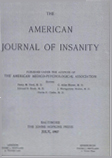THE PSYCHIATRIC MANIFESTATIONS OF HYPOGLYCEMIA
Abstract
It is important for the psychiatrist to appreciate fully the protean nature of hypoglycemic episodes. Invariably, the hypoglycemic attack is characterized by some psychiatric phenomena and indeed the mental symptoms may dominate the clinical picture. As has been pointed out by Allan and others,18 the psychiatrist is frequently called on to render an opinion in cases in which there are bizarre or unusual mental phenomena and he should be "hypoglycemia conscious." There are three major groups of hypoglycemia, (1) that due to injections of insulin, (2) that due to organic pathologic changes in the pancreas or other organs, and (3) that due to unknown causes. The condition is most prevalent in middle life and probably is not as common as was formerly suspected. In our series of 21 cases of noninduced hypoglycemia, nine were proved to be due to islet tumors of the pancreas and operation offered the only hope of improvement, nine patients were operated on but no islet tumor was demonstrated; the etiology in most of these cases was indeterminate. The diagnosis of hypoglycemia may be relatively simple if the cardinal factors of the condition are kept in mind. At times, however, the diagnosis may be exceedingly difficult. This is true as all too frequently the patient presents himself for diagnosis under such unusual or trying situations that the neurologist or psychiatrist, unless he is hypoglycemia conscious, will attempt to explain the findings on the basis of some neurologic or psychiatric disorder. The diagnosis of hypoglycemia is usually made early in the disease, although at times eight to ten years may elapse before the nature of the condition is recognized. The symptoms of hypoglycemia may range from mild apathy to mania or coma; there is no single mental syndrome that is pathogonomonic of the condition. As important as a low value for the fasting blood sugar may be, a single low value for the blood sugar does not in itself prove that the symptoms are hypoglycemic in origin.
The exact mechanism by which hypoglycemia produces its effects on the nervous system is not known. In our treatment of 13 patients who had schizophrenia we have been able to observe the mental and nervous phenomena during approximately 350 deep comas. Profound changes in cerebral functions occur during hypoglycemia and the possibility that hypoglycemia may produce pathologic changes in the central nervous system should be appreciated. Thus far, we have encountered no ill effects from the use of insulin-shock therapy in schizophrenia.
Access content
To read the fulltext, please use one of the options below to sign in or purchase access.- Personal login
- Institutional Login
- Sign in via OpenAthens
- Register for access
-
Please login/register if you wish to pair your device and check access availability.
Not a subscriber?
PsychiatryOnline subscription options offer access to the DSM-5 library, books, journals, CME, and patient resources. This all-in-one virtual library provides psychiatrists and mental health professionals with key resources for diagnosis, treatment, research, and professional development.
Need more help? PsychiatryOnline Customer Service may be reached by emailing [email protected] or by calling 800-368-5777 (in the U.S.) or 703-907-7322 (outside the U.S.).



